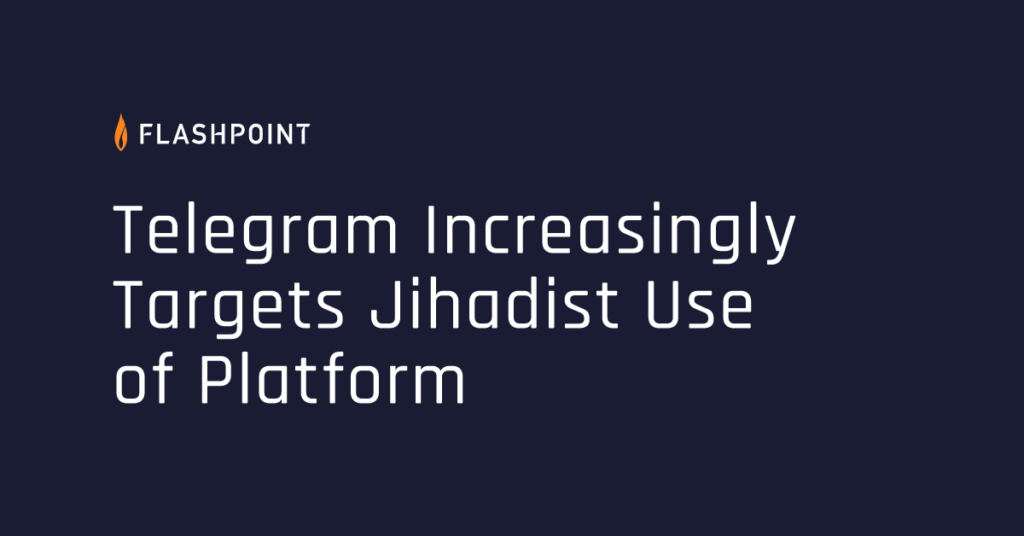Blog
Telegram Increasingly Targets Jihadist Use of Platform
Over the last six months, Telegram launched two major campaigns against jihadists’ presence on its platform. At the end of November 2019, Telegram began what was then the largest purge of jihadist accounts as part of the 16th Referral Action Day led by the European Union Internet Referral Unit. This campaign significantly—albeit temporarily—disrupted jihadist communication and propaganda networks.

Over the last six months, Telegram launched two major campaigns against jihadists’ presence on its platform. At the end of November 2019, Telegram began what was then the largest purge of jihadist accounts as part of the 16th Referral Action Day led by the European Union Internet Referral Unit. This campaign significantly—albeit temporarily—disrupted jihadist communication and propaganda networks.
However, as jihadists experimented with alternative platforms and their attempts to regroup on Telegram decreased temporarily, the platform appeared to ease off. In the ensuing three months, jihadists managed to regrow on Telegram, aided in part by the increasing reliance on bots to distribute propaganda and provide invite links. Dozens of official and unofficial channels, groups, and bots reappeared, and users returned. Notably, while ISIS initially sent invite links for its official channels and groups privately to supporters through direct messages to ensure longevity, it quickly began posting those links openly once again.
More recently, starting on April 9, 2020, Telegram significantly increased removals of jihadist content on its platform, suspending tens of thousands of accounts, channels, and bots in the largest one-month purge of jihadist content in Telegram history.
Data released by Telegram regarding the number of channels and bots removed over the last six months highlights the platform’s fluctuating efforts:
Jihadists will likely continue using the platform—at least for media access, archiving and private communication—for the short to medium term. However, that may change if the alternative platforms prove to be reliable and Telegram maintains a degree of pressure for the next few months.
ALTERNATIVE PLATFORMS
Despite Telegram’s enduring appeal and importance for jihadists, these actors are no longer as dependent on the platform as they once were, having established networks on many other platforms. Among the most notable alternatives are Rocket.Chat and Hoop. The growing popularity of these platforms has further driven the transition of what was once a largely centralized jihadist virtual space—centered around Telegram—to a more dispersed landscape consisting of several established platforms.
While jihadists have been active on Rocket.Chat for almost eighteen months, jihadists’ (primarily ISIS’s) presence on Hoop has exploded over the last few weeks, largely driven by Telegram’s recent actions. Most of the major ISIS groups and media units—both official and unofficial—have established channels and groups on the platform.
Hoop’s security features include encrypted video and audio calls; a password-protected vault that encrypts chats, files, and photos; and a built-in virtual private network (VPN) browser. Users can also create multiple accounts and aliases under the master account. Additionally, if a user’s phone is lost, the owner can remotely destroy their content via Hoop’s website. These features all lend appeal to the platform to jihadists and possibly other threat actors.
TELEGRAM REMAINS MAJOR HUB FOR ILLICIT ACTORS
It remains to be seen how long Telegram will maintain significant pressure on jihadists, but, should its targeting fade—as it has done previously—those actors will likely regrow their presence on the platform. Flashpoint has observed that jihadists have struck a defiant tone—as they typically do— about the suspensions, vowing to return.
Telegram continues to host many other extremist groups, some of which—including Hezbollah, Kataeb Hezbollah, and the Russian Imperial Movement (RIM)—have been designated as terrorist entities by the United States. The platform is also home to cybercriminals, who use the platform to facilitate and promote their activities.
TELEGRAM ANNOUNCES MILESTONE AND NEW FEATURE
While Telegram has yet to comment on the recent uptick in suspensions of jihadist accounts, it coincides with the April milestone of the platform reaching 400 million users, and the announcement that it intends to launch a secure group video feature to compete with Zoom and further grow its membership:
There are apps that are either secure or usable, but not both. We’d like to fix that, and we will focus on bringing you secure group video calls in 2020.

